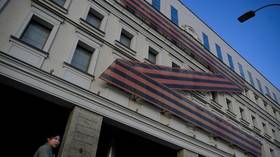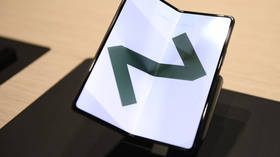
A court in Hamburg found him guilty of endorsing Russia’s offensive in Ukraine, and has ordered him to pay €4,000

A woman walks past a theater building adorned with the letter ‘Z’, styled as the black and orange ribbon of Saint George, September 27, 2022, Moscow, Russia © AFP / Natalia Kolesnikova/AFP
Displaying the last letter of the Latin alphabet in the rear window of his car could cost a German man €4,000 ($3,988). A court in Hamburg found the 62-year-old guilty of supporting Russia’s military operation in Ukraine, ruling that ‘Z’ is a symbol of support for Moscow’s actions.
The verdict was handed down on Tuesday, a court spokesperson told German media.
According to the public prosecutor’s office, the defendant had attached a white sheet of paper with a blue ‘Z’ to his vehicle, and on March 29, drove along one of Hamburg’s central streets.
“Therein, in the court’s opinion, lies an endorsement of the Ukraine war through solidarization with Russia, which is a war of aggression as per international law,” the court ruled.

While the man did not deny displaying the symbol, he argued before the court that it merely represents the last letter of the alphabet. The defendant added that trying to establish a connection between the letter and the Ukraine conflict was a “very, very bold hypothesis.”
He also offered some other possible interpretations, including the French-Algerian film ‘Z’, as well as a now-defunct bar in Hamburg which bore the same name.
The defense team claimed the letter was a reference to media reports on ‘Generation Z’.
The defendant has the right to appeal the verdict.
The man was originally given a €1,800 fine. He lodged an appeal and was given a public hearing. Having failed to prove his innocence, he has now ended up with an even bigger fine.
The ‘Z’ symbol was first spotted on Russian military hardware soon after the Kremlin launched its military operation in the neighboring country. It quickly gained currency among Russians who support the campaign. Over the past few months, the letter has been incorporated into banners and billboards by regional officials.
In Germany, as well as several other European nations, the use of the symbol in contexts where it is seen as supportive of Moscow’s actions has been outlawed.




